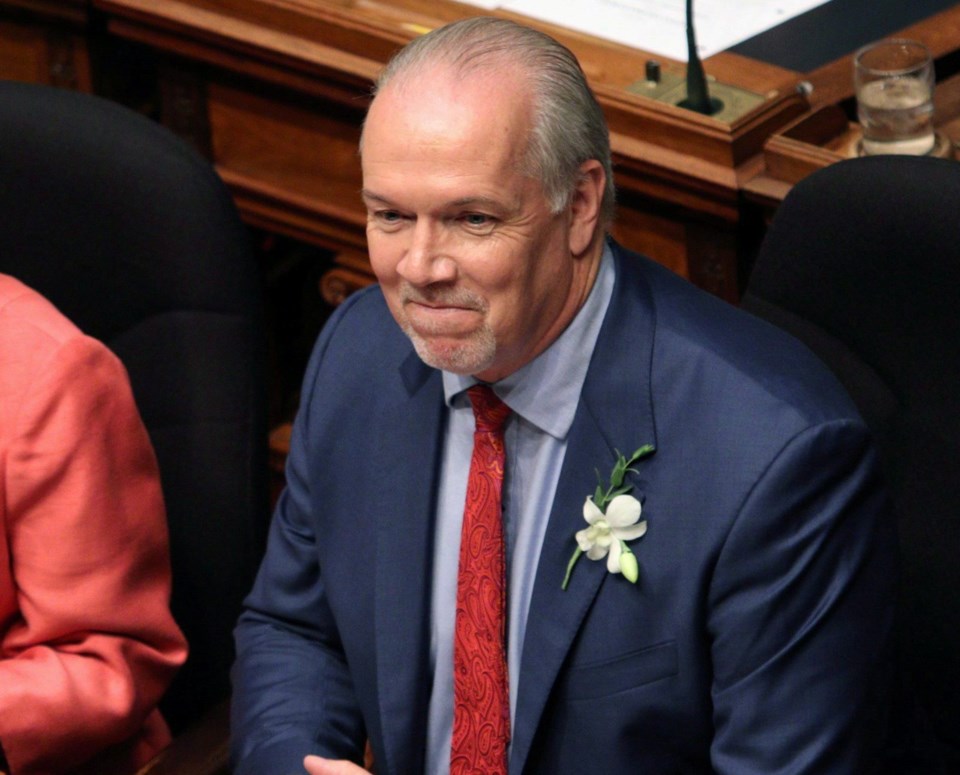Premier John Horgan is defending a “temporary” taxpayer subsidy for political parties, saying it is necessary to eliminate the influence of union and corporate money on B.C. politics.
Under fire in the legislature on Tuesday, Horgan said the government’s plan to ban union and corporate donations and cap individual contributions at $1,200 a year represents a “sea change” in B.C. politics and that a transition allowance will help parties adjust to the new system.
“It is a massive change in how we do business in British Columbia,” he said. “We believe it’s good public policy to have a transition that’s a modest cost to taxpayers in the grand scheme of things and will be gone in four years.
“I think it’s critically important that you not make this what it’s not — this is not public financing from now until the end of the time.”
He said the government reviewed systems across Canada. “We rejected pure public financing — we rejected that — and instead we put in place a transition fund that will decline year over year and will no longer exist at the end of this parliament.”
The proposed transition allowance for parties begins in 2018 at $2.50 per vote received in the last election. Based on that, the Liberals and NDP will each receive about $2 million while the Green Party will get $830,000. The allowance drops by 25 cents a year to $1.75 per vote by 2021 and will cost about $16.4 million over four years.
The allowance ends in 2022 unless a special legislative committee decides it should continue.
In addition, parties and candidates, for the first time, will get 50 per cent of their election expenses reimbursed every four years, which the government says will cost taxpayers about $11 million per election.
Opposition house leader Mike de Jong confronted Horgan in the legislature with comments he made to the media prior to the election in which he denied that it was his plan to use public money to finance political parties.
“Was it the premier’s idea to break his word, or was this forced upon him by the head of his wholly owned subsidiary down at the other end of the hall here?” de Jong asked. “British Columbians want to know. Did he break the word on his own? Or was it forced upon him by members of the Green Party?”
Horgan fired back by pointing out that the Liberals previously rejected six NDP bills to ban union and corporate donations.
“What British Columbians now know is that big money will no longer influence the decisions of their government,” he said. “What British Columbians now know is that the people on that side of the house, who depended on a handful of contributions that made up millions and millions of dollars of their political coffers, is no longer going to happen. That’s what British Columbians asked for, and that’s what they’re going to get.”
Outside the house, Horgan faced questions about why he abandoned his previous pledge to let an independent panel led by the chief electoral officer decide the issue. Horgan said he scrapped the idea after forming a government backed by the B.C. Green Party.
“We’re in a minority parliament. We canvassed these issues with the Green Party. I’m unapologetic about that. We’re working together to bring in comprehensive change to get big money out of politics.
“I’m owning up to what I said before the campaign; I don’t want you to think that I’m running away from this, because I’m not. But it is not what you’re making it out to be. This is a transition fund and will be gone at the end of this mandate.”
Green Party Leader Andrew Weaver said the subsidy wasn’t his party’s idea, but the Greens support it. “We did not bring this to the table,” he said. “But we understand that for bigger parties, it’s more of an issue.”
Transitional funding through a public subsidy is not a new idea, Weaver said, pointing to the federal model.
When the federal government banned union and corporate donations in 2004 under Prime Minister Jean Chrétien, it added a $2-per-vote subsidy. Prime Minister Stephen Harper phased out the subsidy after winning a majority in 2011.
“We support the notion of building upon best practices that are out there, so we support this bill,” Weaver said. The alternative, he said, would be setting the individual contribution limit higher, giving the example of Alberta, which allows up to $4,000 in individual contributions but depends on no public subsidy. Weaver said that limit is too high and only affordable to the rich.
“Let me tell you, we can run with less money. We did very well in the province with a fraction of the funding spent by others, very bottom-up, very much grassroots. We support that, but also recognize that there are bigger parties and the transition for these bigger parties is not easy,” Weaver said.
He said the Green Party is open to “good faith” amendments put forward by the Liberals, which means amendments that aren’t submitted at the last minute as a “political stunt.”



